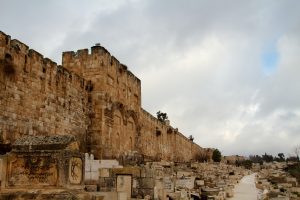
“O Lord, I pray, please let Your ear be attentive to the prayer of Your servant.” Nehemiah 1:11
Many Christians know the Lord’s Prayer. But have you heard of Nehemiah’s prayer? Much like the Lord’s Prayer, Nehemiah’s prayer has a particular structure, rich with depth and meaning. But who was Nehemiah, and how can we know his prayer is effective for us today?
The book of Nehemiah, an often-overlooked portion of Old Testament Scripture, comes immediately after the book of Ezra. Though written in the first person, both Jewish and Christian traditions say Ezra is its author. In fact, the Greek Septuagint and Latin Vulgate both call it “Second Ezra.”
As a priest-scribe, Ezra had rare access to the royal archives of the Persian empire at that time, which is evidenced several times in the book of Ezra. Because of his privilege, Ezra was able to detail Nehemiah’s activities as well as have access to Nehemiah’s personal diaries.
Who Was Nehemiah?
Nehemiah is most often referred to as a cupbearer (though later he was appointed governor of Jerusalem for two terms). His job was to taste the wine to make sure it did not poison the king. He served under King Artaxerxes (suggesting an early captivity during the Babylonian conquest) and for about another 40 years after the Persian empire defeated the Babylonians.
(Fun fact: King Artaxerxes’ stepmother was Queen Esther.)
Like Joseph and Daniel, Nehemiah attained great significance within the king’s palace by becoming the king’s closest confidant and most trusted advisor. This placed Nehemiah in the perfect position to lead the rebuilding of Jerusalem’s walls, which the Babylonians had destroyed.
This was the third attempt to rebuild the city walls. Zarubbabel and Joshua made the first attempt in Ezra 1-6 after their release from captivity. Chapters 7-10 then chronicle Ezra’s second attempt in 458 B.C. Nehemiah made his attempt thirteen years later.
Nehemiah’s Prayer
We find Nehemiah’s prayer right away in chapter one. He had just received news from a friend that the survivors of the Babylonian captivity were in “great distress and reproach.” The walls of Jerusalem were broken down, and its gates burned. Without them, there can be no community. The news tore Nehemiah’s heart apart, prompting him to begin fasting and praying to God.
“I beg you, Yahweh, the God of heaven, the great and awesome God, who keeps covenant and loving kindness with those who love Him and keep His commandments: Let Your ear now be attentive, and Your eyes open, that You may listen to the prayer of Your servant, which I pray before You at this time, day and night, for the children of Israel Your servants, while I confess the sins of the children of Israel, which we have sinned against You. Yes, I and my father’s house have sinned. We have dealt very corruptly against you, and have not kept the commandments, nor the statutes, nor the ordinances, which You commanded Your servant Moses.
“Remember, I beg You, the word that You commanded Your servant Moses, saying, ‘If you trespass, I will scatter you among the peoples; but if you return to Me, and keep My commandments and do them, though your outcasts were in the uttermost part of the heavens, yet I will gather them from there, and will bring them to the place that I have chosen, to cause My name to dwell there.
“Now these are Your servants and Your people, whom You have redeemed by Your great power, and by Your strong hand. Lord, I beg You, let Your ear be attentive now to the prayer of Your servant, and to the prayer of Your servants, who delight to fear Your name; and please prosper Your servant today, and grant him mercy in the sight of this man.
“For I was the king’s cupbearer.” (Nehemiah 1:5-11 WEB)
Journey Back to Jerusalem
The Lord heard Nehemiah. Four months later, while serving wine to King Artaxerxes, his sadness is so great he cannot hide it, and the king quickly notices.
“Why is your face sad, since you are not sick? This is nothing but sorrow of heart.” (Nehemiah 2:2 NKJ)
Allowing oneself to appear sad before the king was highly risky. Kings usually required happy demeanors while in his presence—those who did not risk severe punishment, including possible death.
For Nehemiah to openly show his sadness indicates a strong relationship with the king. Therefore, Nehemiah gives the king a short rundown of what has happened to Jerusalem. The king simply answers, “What do you request?” (v4)
Artaxerxes graciously allows Nehemiah to return to Jerusalem to rebuild the walls. He also gives Nehemiah letters to hand to the governors, telling them to grant permission for Nehemiah to pass safely through their territories along the way.
Nehemiah and his workers eventually finished rebuilding the walls in a record 52 days, though they endured relentless threats and bullying by their enemies, both without and within. At the temple’s dedication, Ezra read aloud all of Moses’ law, and a great revival spread among the Jews as they celebrated an extended Feast of Tabernacles.

7 Elements of Prayer
So, what made Nehemiah’s prayer so special that it moved God’s heart in such an amazing way? Let’s break it down.
Praise
“I pray, Lord God of heaven, O great and awesome God, You who keep Your covenant and mercy with those who love You and observe Your commandments….” (v5)
Nehemiah begins by giving God praise, which is also what Jesus tells us to do in the Lord’s Prayer (Mt 6:9-13). We should always begin our prayers this way, by acknowledging God’s greatness.
Recall that Nehemiah prayed this after the Persian King Cyrus released the Israelites after seventy years in Babylonian captivity. By praising God for always keeping His promises, Nehemiah declares God’s character, using it as a basis to ask God to intervene in the situation.
Petition
“…please let Your ear be attentive and Your eyes open, that You may hear the prayer of Your servant which I pray before You now, day and night….” (v6)
Immediately following praise, Nehemiah requests that God pay attention to him. We know God is always paying attention to us, but Nehemiah does not want to take any chances. He specifically asks God for it.
His statement “which I pray before You now, day and night” indicates his anxiousness for God to respond and his commitment to keep asking.

Confession
“Both my father’s house and I have sinned. We have acted very corruptly against You, and have not kept the commandments, the statutes, nor the ordinances which You commanded Your servant, Moses.” (v6-7)
Nehemiah openly admits his family has sinned, that they have not kept any of God’s laws. He might also be talking about the returning captives. We, too, should confess our sins and repent every time we pray so our sins do not interfere with God’s perfect work in our lives.
Remind God
“Remember, I pray, the word that You commanded Your servant, Moses, saying, ‘If you are unfaithful, I will scatter you among the nations, but if you return to Me and keep My commandments and do them,, though some of you were cast out to the farthest part of the heavens, yet I will gather them from there and bring them to the place which I have chosen as a dwelling for My name.” (v8-9)
Recalling what God has promised in His word is an excellent tool to use when you pray. God knows His promises, but when we remind Him of them, He knows we are serious about our faith. It deepens our connection with Him and strengthens our relationship with the Creator of the universe.
Humility
“Now these are Your servants and Your people whom You have redeemed by Your great power, and by Your strong hand.” (v10)
Nehemiah acknowledges God’s power of redemption. He mainly refers to the Hebrews’ exodus out of Egypt. Still, he is also confident God will bring an equally successful third deliverance for the rebuilding of the temple in Jerusalem.
Final Ask
“O Lord, I pray, please let Your ear be attentive to the prayer of Your servant, and to the prayer of Your servants who desire to fear Your name; and let Your servant prosper this day, I pray, and grant him mercy in the sight of this man [Artaxerxes].” (v11, with addition)
Nehemiah repeats his request while hinting at the fact that Israel was the place God had chosen for His name’s dwelling (v9). Therefore, the “servants who desire to fear” His name were the people in Jerusalem who had been praying for God to intervene for years.

The Big Finish
Note that Nehemiah simply ends his prayer in verse eleven. He does not say, “In Jesus’ name” as we do today. Ending prayers this way was common in Old Testament times because the Messiah had not yet come. However, now that Jesus has come, if we are praying for something specific, we should ask for God’s favor “in Jesus’ name.” Jesus teaches us to pray this way in John 14:13.
“You can ask for anything in my name and I will do it, so that the Son can bring glory to the Father.” (NLT)
He also says in Matthew 21:22, “And whatever you ask in prayer, believing, you will receive.”
Nehemiah clearly believes God will do what He said He would do, and we can, too. If we genuinely believe, end your prayers with “in Jesus’ name” so we can properly glorify Him.
Fervent Praying
It must be emphasized that Nehemiah’s prayer is not the official way to pray. There is no specific structure or step-by-step instruction for praying, including the Lord’s Prayer. God is more interested in hearing what you have to say, however you want to say it, and the fact that you are seeking Him.
Nevertheless, basing our praise and repentance in humility is essential to any prayer. We must humble ourselves before our mighty God and acknowledge who He is, that is, not only His power but also His great love for us.
James 5:16 tells us, “The fervent prayer of a righteous man avails much.” Without question, Nehemiah prayed fervently. According to Scripture, his prayer moved God’s heart, and he was allowed to rebuild Jerusalem’s walls with the king’s blessing. Your prayers can move God, too.
Whatever you are going through, allow Nehemiah’s example to guide you through your next talk with God so that you can experience miracle breakthroughs.
Further Reading
Nehemiah gave us several elements we should include when we pray. Jesus also tells us a few dos and don’ts of praying in Matthew 6. Click here to discover Jesus’ advice on making our prayers more effective.


Great article, God bless you!
Thank you, Roy. God bless you as well.
I an in awe of the insight I have gained. As did Jehosaphat, Nehemiah graciously reminded God of His astounding resume of love, care and power. I truly needed this. Thank you and God bless .
Thanks for reading, Jacobus. May the Lord bless you as well.
I am so glad that I came across this devotion. Prayer is the most important part of Christian life but many a times we wander from the real meaning of it and wonder why our prayers are not answered. Thanks for opening my eyes through Nehemiah ‘s prayer.
We am very happy we could bless you.
I am grateful to be reminded of God’s promises n glory be to God the Father and God the Son n God the Holy spirit Amen x
As I begin a series from Nehemiah, this information regarding the prayer is invaluable. What a joy to read and feel as if God is drawing me into a closer relationship with Him for this journey. Thank you for your effort and information about this special person of the bible. God bless
So glad I could bless you. Thanks for reading.
Wao,
This illustration of the prayer of Nehemiah is very instructive .God can be accessed .The prayers were so conversational in nature.
We do not need to go to a bible school to commune with God.
Thank you
God bless you
I loved this simple walk through the importance and power of prayer. I long to learn how to pray effectively; meaning, I want to have an easy and open conversation with God as I lean on His power and strength to find strength in any struggle that I may be facing. I loved this interpretation on Nehemiah’s prayer.
Thank you for this entry. I stumbled upon it one evening and plan to share it with my Small Group. I have a question about an author mentioned in one of the comments. Who is Lynn Austen and where can I learn more about her?
Thank you for this entry. I stumbled upon it one evening and plan to share it with my Small Group. I have a question about an author mentioned in one of the comments. Who is Lynn Austen and where can I learn more about her?
I have never see this book, in this manner..so profound…this reading blows me away. I recently get this book to read this opens up my understanding more and more! Wow awesome God thanks for sharing this book…may God continue to opens up ur understanding more and more. Hallelujah
I have always admired Nehemiah’s prayer and I go and read it again and again, especially when I feel low. The way that it have been put forward here is truly commendable. I am going to share it in my prayer devotional at my church. God bless you immensely.
I appreciate your kind words, thank you. God bless you.
These strings stand complete and substantial for me to fulfil this day of quarantine
May God bless you incredibly..
Wow! Thank you, I remember growing up listening to my dad preach on Nehemiah and I never really got it as a young child. I just always remembered the name. I never really dove into it anytime after that and I’ve been slowly making my way thru a full Bible read and I’ve been dragging my feel some getting through all the Judges – but you’ve given me some amazing insights I didn’t know were there and an eagerness now to read that book. Thank you, this really helped me.
I’m so glad I could help. The Holy Spirit has a great way of opening our eyes at just the right time. May God bless your studying.
I was.so touched by this explanation about Nehmiya’s prayer. So beautiful. I.learnt a lot from this.
I’m so glad I could bless you. Thanks for reading.
“His struggles and triumphs are a great reflection of what so many of us go through as we try to serve God.” Well said! Wonderful exposition of this book, well done. We walked through the book of Nehemiah at my church a couple years ago. It is powerful!
It really is! I love the book of Nehemiah. So many rich lessons in it for all of us. I appreciate you stopping by, Kirsten.
I’ve enjoyed Nehemiah’s prayer, especially since reading Lynn Austin’s Restoration Chronicles. But I don’t think I’ve ever taken the time to analyze it like this. Breaking it down like this is cool!
That means a lot coming from you, Aryn. Thanks so much for reading.
Thanks, Jennifer! I appreciate the support. God bless!
This post is so informative. I am sharing it and pinning it to several large boards.